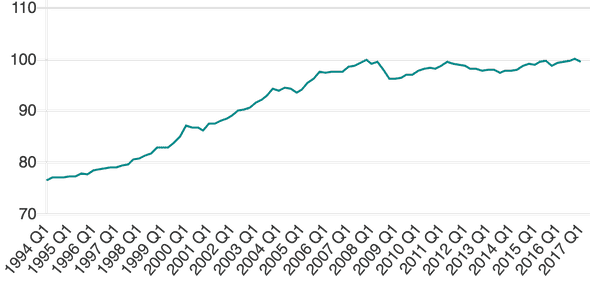Skills Gap, Newsletter 7
October 09, 2017
 The teaser trailer for sci-fi film Annihilation came out.
The teaser trailer for sci-fi film Annihilation came out.
I’m no economist but here’s some things I’ve been thinking about for the last couple weeks. It’s going to start off looking at some economics stuff and then relate that to a skills gap between Millenials and Generation Z. Hope you’re having a nice October.
Summary
- The UK Government failed to educate my generation adequately with technical skills, when it should have been obvious that this would increase worker productivity
- This will lead to a continuing lag in worker productivity, which is potentially really bad for the long term economy.
- The government missed the boat with my generation teaching coding, and they’ve just caught up. Coding is now being taught to kids and is taken seriously by parents as an beneficial skill to learn.
- The technical skills gap between the generation above my parents is large, but I think the skills gap between my generation (Millenial) and the generation below (Z) will be even larger. This is because parents/government understand that teaching coding skills from age 9 is an important skill now, something my generation missed out on.
- There’s an increasing number of coding clubs around the UK, Codeclub, Coderdojo, Turing Lab. Generation Z are digitally native and so learning to code isn’t seen as this hard anti-social thing.
- But children born today are heading into a world, a decade or two from now where Artificial Intelligence will be at some rate, possibly Exponentially, stronger and more prevalent than it is today. How does a government prepare a future generation for that? Where does that fit in an education curriculum?
Skills Gap
Some key indicators of the UK economy look pretty good. Unemployment is at record lows, GDP growth is positive, and consumer spending has risen.
But UK productivity, a key driver in economic growth, hasn’t moved in 10 years. We have all this technological possibility for workers to do more work, but it hasn’t happened.
The Office for National Statistics came out with the figures and they aren’t pretty:
The ONS points out that output per hour in the UK was 15.1 per cent below the average for the rest of the G7 in 2016. It was 9 per cent below the rate in Italy, nearly 22 per cent below the US, over 22 per cent lower than in France and some 25.6 per cent lower than in Germany.
This is partly because it’s straightforward to take advantage of technological innovation in countries that have more manufacturing. If the benefits of the new machine outweigh the cost over X years of the machine depreciating then you can buy that new machine and make more stuff.
Side note: remember that Western manufacturing is coming back from abroad where the cost of manual labour was less than getting a robot to do it. But now we’re seeing robots claim jobs in manufacturing, read more at the Economist’s: Adidas’s high-tech factory brings production back to Germany. This is an interesting trend that’s worth keeping an eye on.
However the UK is predominantly a services based economy with workers who aren’t (yet) machines.
So we’ve got this economy driven by the work done by people in like… every industry. Film, finance, consulting, any industry, the UK’s pretty good at “pay me to do X” and it’s all very people driven.
And the quality of the service depends on the people. And the quality of the people depends on their education.
And the UK government over the last two decades massively blew it when it came to educating people about how to take advantage of technology.
For the last two decades I.T skills were learning how to make a Powerpoint and do a bit of Excel, but not really anything substantial. You’ve got a generation of young people who’ve grown up consuming all the latest technology but not a clue how to use it to make stuff or make existing processes more efficient.
In fairness, the government has been doing its best to change course. There’s been a resurgence now with things like the Raspberry Pi and the BBC’s micro:bit. These are cheap £20 computers loaded with software that makes computing accessible to any child.
But that’s 2017, I’ve got friends who are now university graduates to which coding seems baffling, and now you’ve got 11 year olds being given Micro:bits saying:
90% agree that BBC micro:bit helped to show them that anyone can code
and:
88% agree that BBC micro:bit helped them to see that coding isn’t as difficult as they thought it was
At this point go read what Chris Granger (who’s this clever computer guy) says in his 2015 post Coding is not the new literacy.
We don’t want a generation of people forced to care about Unicode and UI toolkits. We want a generation of writers, biologists, and accountants that can leverage computers.
Onto the stories.
Stories
I asked Tinder for my data. It sent me 800 pages of my deepest, darkest secrets
Tinder is often compared to a bar full of singles, but it’s more like a bar full of single people chosen for me while studying my behaviour, reading my diary and with new people constantly selected based on my live reactions.
If data is the new oil, are tech companies robbing us blind?
“The case I would make against the practice is moral, not legal … this just shows the inadequacy of current approaches to contract law, since it is well-known that people are willing to accept even the most outlandish terms and conditions.” (During a 2014 experiment, unwitting participants in London agreed to give up their eldest child by agreeing to public Wi-Fi terms.)
The History of Sears Predicts Nearly Everything Amazon Is Doing
From its founding in the late 19th century to its world-famous catalog, the history of Sears, Roebuck & Company is well known. Less storied is its magnificently successful transition from a mailing company to a brick-and-mortar giant. Like Amazon among its online-shopping rivals, Sears was not the country’s first mail-order retailer, but it became the largest of its kind. Like Amazon, it started with a single product category—watches, rather than books. But, like Amazon, the company grew to include a range of products, including guns, gramophones, cars, and even groceries.
Elon Musk’s Making Life Multiplanetary
This talk was the most Elon Musk talk I’ve ever seen. It’s 43 minutes long and I recommend watching all of it.
But if you don’t have time,the 2 minute advert for 20 minute flights from London to New York is here, and the advert for colonising Mars is here.
There is rarely anything actually exciting about a new phone, laptop or gizmo. iPhone X, Google Pixel 2 - these devices ride along a fading Moore’s law and their creators work hard to bring the latest software/hardware advances of the year into their products at a price that will sell to the mass market.
But painting a picture of a possible multi-planetary future? Coolest news story of the month.
IMF Head Foresees the End of Banking and the Triumph of Cryptocurrency
In a remarkably frank talk at a Bank of England conference, the Managing Director of the International Monetary Fund has speculated that Bitcoin and cryptocurrency have as much of a future as the Internet itself. It could displace central banks, conventional banking, and challenge the monopoly of national monies.
1985 Playboy Interview: Steve Jobs
I mentioned earlier that most new gizmos aren’t exciting, here’s an interview that covers the release of the 1984 Macintosh, the computer that commercialised the personal computer and set the vision for what computing would be for the everyday person.
Jobs: The most compelling reason for most people to buy a computer for the home will be to link it into a nationwide communications network. We’re just in the beginning stages of what will be a truly remarkable breakthrough for most people—as remarkable as the telephone.
Playboy: Specifically, what kind of breakthrough are you talking about?
Jobs: I can only begin to speculate. We see that a lot in our industry: You don’t know exactly what’s going to result, but you know it’s something very big and very good.
The world wide web was invented 4 years later.
Thanks for reading! If you have any comments, questions or feedback please get in contact. Have a nice Sunday.
I'm Henry Moulton, a software design and development freelancer living in London, UK.
My portfolio will be online soon.
